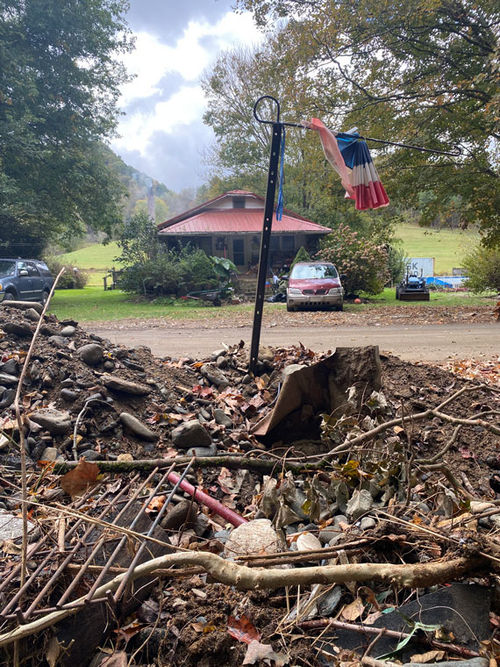ROAN MOUNTAIN, Tenn. -- This time of year, western North Carolina and eastern Tennessee would normally be crawling with leaf peepers, hikers and vacationers enjoying the crisp autumn days, the changing colors of the trees on the mountains and sitting around a crackling fire.
That is how I had planned to spend a week here in October, meandering along a shared state line on the Appalachian Trail to enjoy the foliage. Then I'd hit up a few pubs, stay a night or two in my favorite trail towns and shop at locally owned outfitters, perhaps for a new pair of trail runners.
Hurricane Helene changed all that. Instead of focusing on tourism, many people in this area are gutting their homes or businesses of everything destroyed by the storm, which wreaked havoc on much of this region on Sept. 28. I spent the better part of my week here volunteering in the northern corners of both states, clearing debris and garbage from a muddy backyard, picking a headless doll and other trash from the bank of a stream and sorting food donations at a church.
Some affected by the storm in these states still lack running drinking water and are suffering through spotty electricity and iffy internet as the nighttime temps flirt with freezing. Meanwhile, crews continue to search for missing people possibly swept away by massive flooding.
Tourists wanted
After initial pleas from government officials for tourists to stay away, some areas here are reopening and want tourists back.
Visit Smokies, a nonprofit tourism-promotion group, put up a billboard in Clayton, Georgia, en route to the Smoky Mountains. It read "Visitors Needed" in capital letters and listed 11 towns in southwestern North Carolina, including Franklin, Highlands and Cashiers.

A pile of rubble and items like grates and garden hoses sit washed up from Hurricane Helene floodwaters in Roan Mountain. Photo Credit: Andrea Zelinski
Helene, which made landfall in Florida as a Category 4 hurricane, traveled more than 400 miles into Tennessee and North Carolina, dumping heavy rain on an area already saturated from days of precipitation. Water levels swelled to record levels, consuming homes and businesses in towns large and small. Water, electricity and internet were knocked out and are still not available or are spotty in places.
This disaster crushed the area's tourism economy. Tourism contributed $3 billion to the Asheville, N.C., and Buncombe County economy last year, according to the Buncombe County Tourism Development Authority.
A month after the storm, the Asheville area is reopening "in stages and pockets," said Explore Asheville CEO Vic Isley. The airport is open and operational. The Biltmore, a historical house museum in Asheville, plans to reopen on Nov. 2. Buncombe County, Asheville and Black Mountain are designated as safe to visit, according to Visit North Carolina.
"Many businesses are starting to open their doors, though some may have limited hours or reduced menus," Isley said.
She recommended visitors plan ahead, confirm availability for lodging, visit respectfully and pack their patience. She also suggested checking DriveNC.gov for information on safe and open roads.
But Gene Sloan, the cruise team lead at The Points Guy who has a home in Asheville, last week discouraged people from visiting the city, saying many places are still closed.
"The downtown really isn't functioning yet. Many of the restaurants and bars are boarded up, as they can't operate without clean water. Many shops are boarded up, too," he said. "It feels a little dystopian. Lots of people have fled, and the tourists are gone, which gives it an abandoned feel."
(A spokesperson from Explore Asheville said more restaurants and business are opening daily and are investing in their own water sources. The spokesperson pointed to resources with lists of open restaurants according to Asheville Independent Restaurants and Explore Asheville, and the Instagram account from the Asheville Downtown Association.)
A great need for volunteers
Having a deep love for Appalachia, I didn't consider canceling my planned week of hiking when I knew it could instead be a week of helping.
Aside from the cleanup and food distribution, a friend and I did tasks like scavenge for materials to help build a footbridge for a woman in her 70s to cross the North Toe River on her property in the community of Roaring Creek.
Her previous bridge washed away, leaving her unable to depart by car and face a long, uphill walk to leave the property.
Needs throughout the area were great. JD Westerman, owner of The Station at 19E, a well-known pub and hostel on the Appalachian Trail, normally hosts long- and short-distance hikers and leaf peepers this time of year. Instead, almost all of his guests have been volunteers who he has let stay for free. I was one of them.
There remains a great need for volunteers here -- and perhaps opportunities for volunteer tourism. I plan to look for more ways to visit this area to help out, spend my money and enjoy the vacation experience I had been looking forward to all year.
Update: This article has been updated to include information on restaurants and businesses in Asheville that are open or reopening soon.